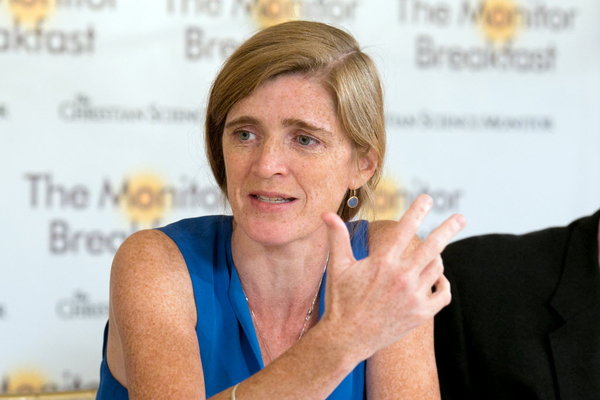Europe has dramatically reduced its contribution to the United Nations peacekeeping force from 25,000 to just 6,000, forcing the so-called “blue helmets” to rely on poorer developing countries to handle humanitarian missions.
But after two years of pressure from Washington, European nations appear ready to pledge some support. President Obama next week is hosting a meeting of some 40-50 nations where the peacekeeping force will be discussed, said Samantha Power, the U.S. ambassador to the U.N.

U.N. Ambassador Samantha Power. Michael Bonfigli/Christian Science Monitor.
“In order to speak, a head of state has to make an announcement about what new they are going to be contributing,” she explained.
Some 20 European nations have indicated they plan to offer more support.
In recent years, rich nations have shifted to simply funding the forces, she said. “You have basically developing countries doing the peacekeeping and developed countries like the United States and the other big donors to the U.N. paying for it,” said Power.
The result is that Europe, which used to supply 40 percent of the peacekeeping force during the 1990s, is just 6 percent now. And apparently without advanced military help, the Third World forces aren’t as prepared to fight.
For example, six U.N. peacekeepers will killed in July when their convoy came under attack in Mali.
Power suggested that the forces don’t have the needed equipment, like drones, to see the attackers coming. The troops “don’t see what’s coming at them,” she said at a media breakfast hosted by the Christian Science Monitor. In Mali, she described “the blindness of the peacekeepers because of the lack of UAVs and the lack of ability to know again which extremists are where.”
At last year’s United Nations meeting, Vice President Joe Biden pushed Europe to do more and this year Obama is leading the charge, she said.
And, Power added, the reason is simple: “We’re calling on more and more peacekeepers to do more in more places, and in more difficult places than ever before and the supply of peacekeepers [is] being outstripped.”
The U.S. is a major funder of the force, providing more than 28 percent of the $8.2 billion budget, and 82 troops. There are over 106,000 peacekeeping troops.
Paul Bedard, the Washington Examiner’s “Washington Secrets” columnist, can be contacted at [email protected].

